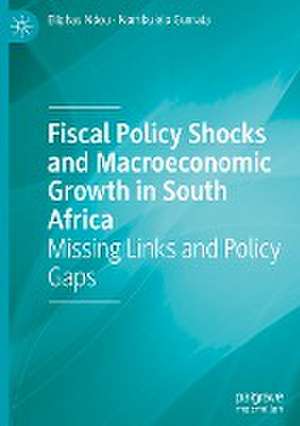Fiscal Policy Shocks and Macroeconomic Growth in South Africa: Missing Links and Policy Gaps
Autor Eliphas Ndou, Nombulelo Gumataen Limba Engleză Hardback – 17 sep 2023
This book provides practical fiscal policy suggestions to increase economic growth in South Africa and Africa more generally. It will be relevant to researchers and policymakers interested in African economics and economic policy.
Preț: 729.53 lei
Preț vechi: 889.68 lei
-18% Nou
Puncte Express: 1094
Preț estimativ în valută:
139.60€ • 146.42$ • 116.21£
139.60€ • 146.42$ • 116.21£
Carte tipărită la comandă
Livrare economică 01-15 aprilie
Preluare comenzi: 021 569.72.76
Specificații
ISBN-13: 9783031377549
ISBN-10: 3031377540
Pagini: 255
Ilustrații: XXXV, 255 p. 155 illus.
Dimensiuni: 148 x 210 mm
Greutate: 0.5 kg
Ediția:1st ed. 2023
Editura: Springer Nature Switzerland
Colecția Palgrave Macmillan
Locul publicării:Cham, Switzerland
ISBN-10: 3031377540
Pagini: 255
Ilustrații: XXXV, 255 p. 155 illus.
Dimensiuni: 148 x 210 mm
Greutate: 0.5 kg
Ediția:1st ed. 2023
Editura: Springer Nature Switzerland
Colecția Palgrave Macmillan
Locul publicării:Cham, Switzerland
Cuprins
Chapter 1 Introduction.- Chapter 2 Synopsis of fiscal policy in South Africa: 1994 – 2020.- Part 1: Government debt.- Chapter 3 Effects of government debt on output, household consumption and gross fixed capital formation: Role of the credit conditions channel .- Chapter 4 Government debt and household consumption: the influence of the wealth channel .- Chapter 5 Government debt and capital formation nexus in South Africa: The role of the debt threshold .- Chapter 6 Government debt and fixed capital formation nexus: Effects of the interest rate and monetary policy credibility channels.- Chapter 7 Inflation targeting band, the government debt and capital formation nexus in South Africa.- Chapter 8 Do high government debt-to-GDP regimes propagate the adverse macro-economic effects of high budget deficit regimes?.- Chapter 9 Debt-to-GDP ratio, investment growth and employment growth, and their response to high nominal GDP growth regimes .- Chapter 10 The impact of the debt-to-GDP ratio on investment growth .- Part 2: Fiscal budget balance deficits.- Chapter 11 Budget deficit thresholds and their macroeconomic impact .- Chapter 12 The impact of a persistent increase in the budget deficit on real interest rates.- Chapter 13 What are the effects of budget deficit regimes on inflation and inflation expectations? .- Part 3: Interest rates.- Chapter 14 Widening budget deficits and investment growth dynamics.- Chapter 15 Do high debt service costs reduce the potency of accommodative fiscal policy in South Africa?.- Chapter 16 What are the macroeconomic effects of a positive interest rate-GDP growth differential shock?.- Part 4: Economic policy uncertainty.- Chapter 17 Economic policy uncertainty and the employment dynamics in South Africa under the inflation targeting regime.- Chapter 18 Economic policy uncertainty, employment dynamics and price stability in South Africa.- Chapter 19 The role of economic and policy uncertainty on the effects of widening budget deficits on yields and the credit default swap spreads.- Chapter 20 Summary of main findings and policy implications.
Notă biografică
Eliphas Ndou is a Senior Lecturer in Economics at the University of South Africa. He has worked as an economist at the South African Reserve Bank and has authored books on international finance, fiscal policy, monetary, labour, macro and microeconomics, banking regulation, and macro-prudential policy.
Nombulelo Gumata is an Economist. She worked at the South African Reserve Bank and has authored several books on international finance and macroeconomics, macro-prudential and regulatory tools and financial stability, labour markets, and monetary, and fiscal policy.
Nombulelo Gumata is an Economist. She worked at the South African Reserve Bank and has authored several books on international finance and macroeconomics, macro-prudential and regulatory tools and financial stability, labour markets, and monetary, and fiscal policy.
Textul de pe ultima copertă
This book explores the disconnect between fiscal policy and macroeconomic development in South Africa. It analyses the factors that have contributed to the lack of economic growth in the country over recent decades and outlines an improved fiscal policy framework that increases investment and employment. Particular attention is given to the impact of government debt and its relationship with GDP, the connection between budget deficits and interest rates, and how economic policy uncertainty affects employment dynamics and inflation.
This book provides practical fiscal policy suggestions to increase economic growth in South Africa and Africa more generally. It will be relevant to researchers and policymakers interested in African economics and economic policy.
Eliphas Ndou is a Senior Lecturer in Economics at the University of South Africa. He has worked as an economist at the South African Reserve Bank and has authored books on international finance, fiscal policy, monetary, labour, macro and microeconomics, banking regulation, and macro-prudential policy.
Nombulelo Gumata is an Economist. She worked at the South African Reserve Bank and has authored several books on international finance and macroeconomics, macro-prudential and regulatory tools and financial stability, labour markets, and monetary, and fiscal policy.
This book provides practical fiscal policy suggestions to increase economic growth in South Africa and Africa more generally. It will be relevant to researchers and policymakers interested in African economics and economic policy.
Eliphas Ndou is a Senior Lecturer in Economics at the University of South Africa. He has worked as an economist at the South African Reserve Bank and has authored books on international finance, fiscal policy, monetary, labour, macro and microeconomics, banking regulation, and macro-prudential policy.
Nombulelo Gumata is an Economist. She worked at the South African Reserve Bank and has authored several books on international finance and macroeconomics, macro-prudential and regulatory tools and financial stability, labour markets, and monetary, and fiscal policy.
Caracteristici
Analyses fiscal policy and economic growth trends from 1994 onward Highlights how budget deficit shocks impact economic yield and credit default swaps Examines the interaction and interplay between fiscal policy and monetary policy
